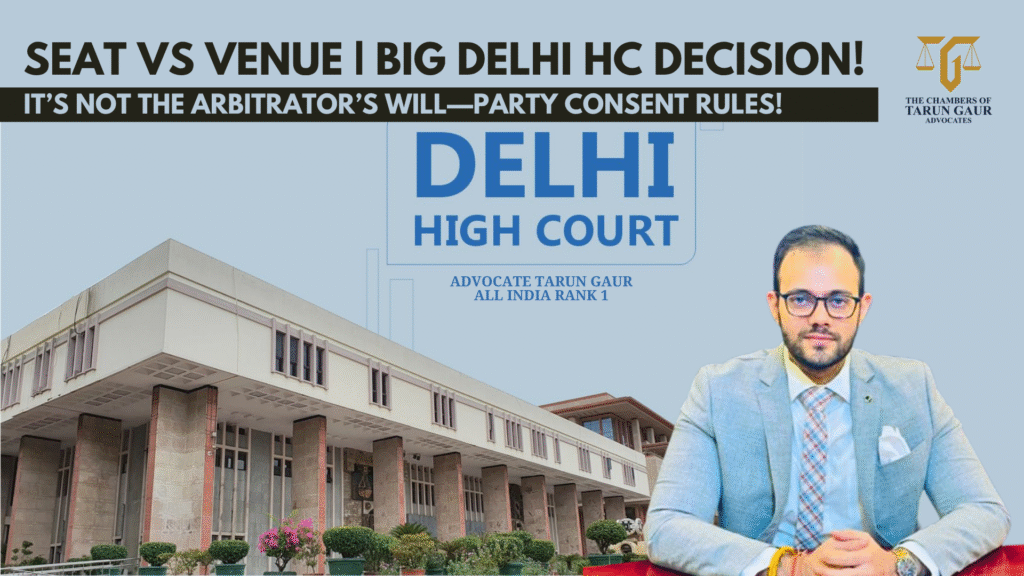By Advocate Tarun Gaur | Best Arbitration Lawyer in Dwarka, Delhi
In a significant recent ruling, the Delhi High Court has once again reinforced a principle I strongly believe in—the primacy of party autonomy in arbitration proceedings.
As an Advocate specializing in arbitration and white-collar crime cases in Delhi, I’ve always maintained that the entire foundation of arbitration law rests on the choice and consent of the parties. Any deviation from this fundamental principle dilutes the very purpose of arbitration, which is to offer a private, consensual, and predictable dispute resolution mechanism.
Case Overview: M/S Viva Infraventure Pvt. Ltd. vs. New Okhla Industrial Development Authority
In O.M.P.(MISC.)(COMM.) 606/2024, the Delhi High Court bench of Justice Jasmeet Singh ruled that when an arbitration agreement contains an exclusive jurisdiction clause, the courts mentioned therein are to be presumed as the ‘seat’ of arbitration, unless parties expressly agree otherwise in writing.
Brief Facts of the Case
-
M/s Viva Infraventure Private Limited, the petitioner, was awarded a contract for the construction of a 60-meter-wide road in Greater Noida by the New Okhla Industrial Development Authority (NOIDA).
-
Clause 32 of the contract contained an exclusive jurisdiction clause, categorically stating that only the courts at Gautam Budh Nagar, Uttar Pradesh would have jurisdiction over any disputes under the contract.
-
The Allahabad High Court appointed a Sole Arbitrator under Section 11 of the Arbitration and Conciliation Act, 1996.
-
However, in the first procedural order, the Sole Arbitrator unilaterally declared New Delhi as the ‘seat’ of arbitration, despite the exclusive jurisdiction clause.
-
Later, when the arbitrator’s mandate expired, the petitioner approached the Delhi High Court under Section 29A(5) for extension of the arbitrator’s term.
Key Issue Before the Court
Can an arbitrator override an exclusive jurisdiction clause by designating a different seat of arbitration without the express consent of both parties?
Delhi High Court’s Ruling
The Court held that:
-
The parties’ choice prevails—where the contract specifies an exclusive jurisdiction for enforcement of the arbitration clause, the courts in that location will be considered the ‘seat’ of arbitration.
-
The phrase in Clause 32—“Any suit or application for enforcement of this arbitration clause shall be filed in the competent court at Gautam Budh Nagar, and no other court shall have jurisdiction”—was deemed decisive.
-
The Sole Arbitrator’s procedural order setting New Delhi as the seat was invalid because the respondent had not consented to it in writing.
-
As per Section 20(3) of the Arbitration Act, an arbitrator may fix a venue for hearings, but cannot alter the contractual ‘seat’ without express party consent.
-
Accordingly, the Court dismissed the Section 29A(5) petition for lack of territorial jurisdiction, ruling that Delhi was merely the venue, not the seat.
Why This Judgment Matters: Upholding Party Autonomy
As a practicing Arbitration Lawyer in Dwarka and Delhi High Court, I fully support this verdict. It reaffirms the non-negotiable nature of party autonomy in arbitration.
If arbitrators or courts begin to rewrite the parties’ agreements, it would fundamentally undermine the Legislative Intent of the Arbitration and Conciliation Act, 1996, which is built upon mutual consent and contractual sanctity.
Key Takeaways for Clients & Corporates:
-
Draft clear exclusive jurisdiction clauses to avoid future disputes over the seat of arbitration.
-
Remember, the seat of arbitration determines supervisory court jurisdiction, not just the geographical location of hearings.
-
Even arbitrators cannot override contractual agreements without both parties’ express consent.
Need Arbitration Advice?
If you’re dealing with arbitration issues, territorial jurisdiction conflicts, or contract drafting, you can consult Advocate Tarun Gaur, recognized among the Best Advocates in Dwarka for arbitration and white-collar litigation.

